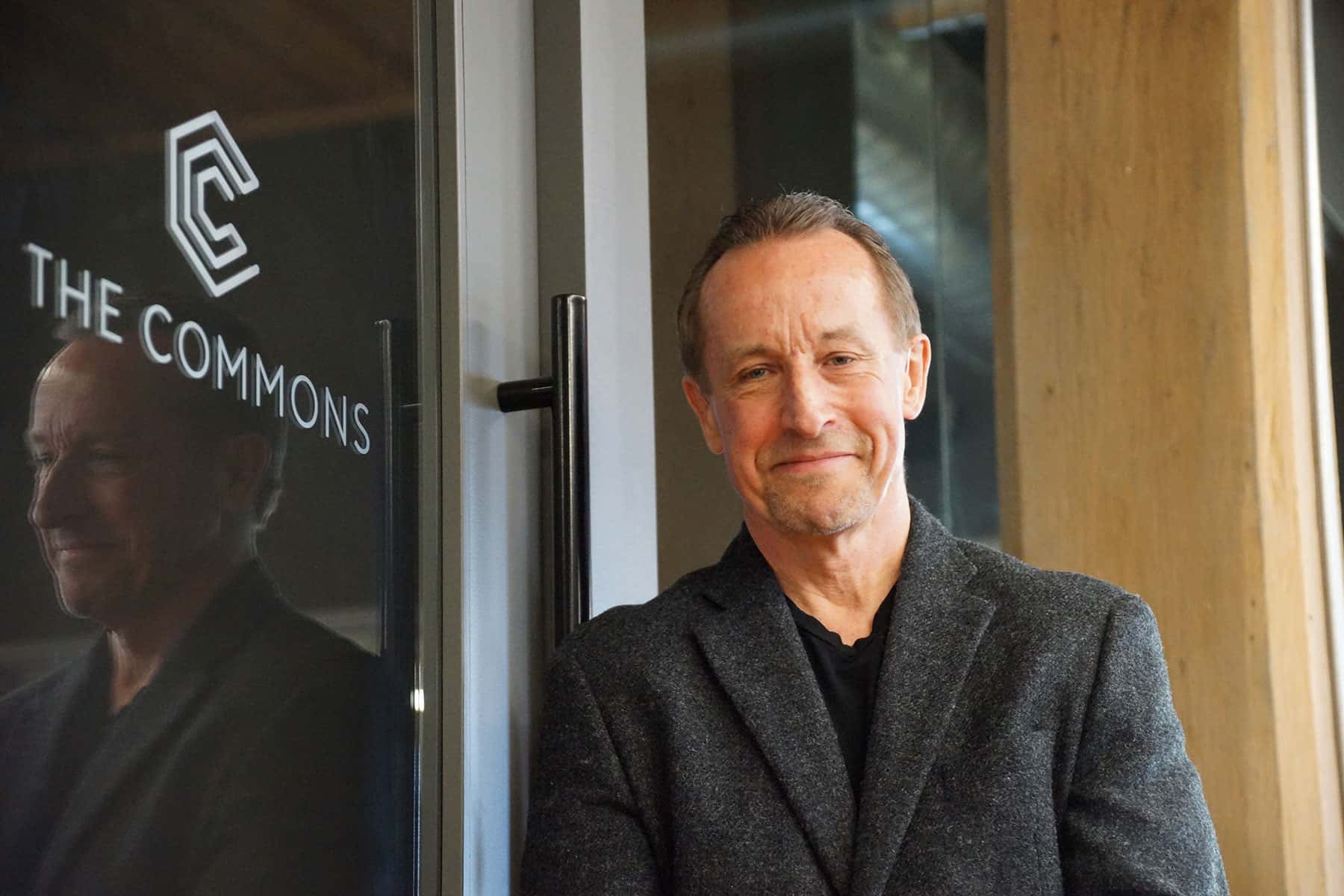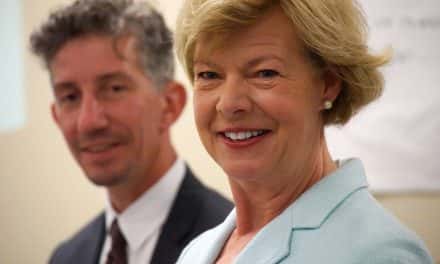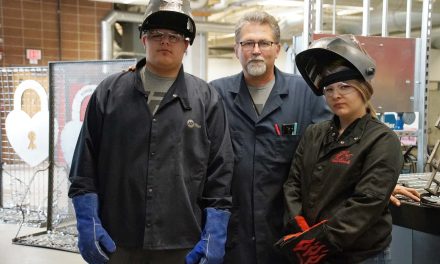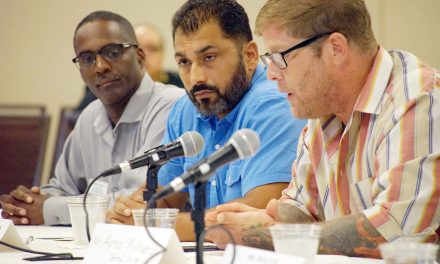
Growing up in a strict Catholic home where nothing changed except dates on the calendar, it was no small step to leave behind the family mink farm to study Sufi mysticism in North Africa.
Yet that step was only one of the many along a journey that Charles P. Ries has walked in his life. Taking him from an experience with the Dalai Lama, to the Hollywood film industry, fundraising for hundreds of nonprofits, becoming a prolific published author, supporting Milwaukee startups, and many points between and beyond in his search for peace, understanding, and God.
Q&A with Charles P. Ries
Milwaukee Independent: With five siblings who chose a life in the convent or seminary, was there family pressure as you explored an alternative path?
Charles P. Ries: My dad thought I should be the mink farmer. In my family there were two career options, become a Catholic nun or priest, or become a mink farmer. None of us wanted that for me. After college, when I left on a three months Euro Rail Trip though Europe, I ended-up staying about two years to study Sufism in England and later North Africa. In a sense, I did became sort of a priest as well. It was my black sheep version doing what most of my family did, look for or serve God.
Milwaukee Independent: Having such a diverse personal and professional background, what would surprise most people to know about you?
Charles P. Ries: That I am a bit introverted, and enjoy my alone time a great deal. When I was young I performed in about fifty plays and I often view day-to-day life that way. We are ON and then we are Off. So people might find it surprising that I can be quite a hermit. But when I am on, I give it all away.
Milwaukee Independent: What inspires you to support innovation and entrepreneurship programs like The Commons?
Charles P. Ries: Through my work at Marquette I have focused my time on people who own businesses. I got very close to the early stage investing program that was founded at the University called The Golden Angel Network. I started a student-run coffee business. I love productive, game changing creations. I really do not distinguish between business or art, as I feel the impulse to create is the same. I have worked with over two hundred non-profits organizations (NPO) over my career as a management consultant and a volunteer, with the goal of helping them optimize performance. I am a junky for great NPO Design. When the co-founders of The Commons and I struck upon this idea we called “The Commons” I was certain it would fly. All we needed was someone like Mike Lovell to gather the 23 schools together and invite them to work with us.They did and we are growing something rather remarkable. We feel it is a national model and has the capacity to grow in many directions.
Milwaukee Independent: Milwaukee was once a hub of innovation with companies like AO Smith and Allen Bradley, so how did the city forget its roots? And can Milwaukee foster innovation again as its DNA for future generations?
Charles P. Ries: That is the way of all things in business. Once they become big and solid, they just keep chugging along, become cautious, and lose their edge. That is why record labels began to buy independent labels, or films made outside of the studio system are so great, or why innovation is so often fostered off-site. In many regards, innovation is outside the system. Many companies I know move their innovation offices off-site because the pressure to be politically correct, or not rock-the-boat is so strong. So I do not know if Milwaukee has forgotten its roots. I think it is more likely that Milwaukee stopped championing innovation and got safe. But this is changing. And thus the emergence of The Commons, Gener8tor, Biz Starts, and Milwaukee Innovation should give us cause for optimism. I feel our community now recognizes we must foster innovation of it will not happen.
Milwaukee Independent: What programs are you involved with that support minority groups in Milwaukee and local community efforts?
Charles P. Ries: I provide mentoring to Messmer Schools and St. Marcus, Of the students in The Commons, 40 percent are women and about 20 percent are minorities. We are all well aware of the fact that Milwaukee is very racially divided.
Milwaukee Independent: What did working for The Oram Group teach you about philanthropy work?
Charles P. Ries: The majority of our clients were center to far left, many were minority groups, museums and so forth. Most of my mentors in fund raising and philanthropy were Jewish and I just love their direct approach to doing good and getting done. When I was with The Oram Group I learned the business of philanthropy, how boards need to be structured, how leaders need to be positioned, why founders can grow or kill an organization. I have been in and around philanthropy for over 40 years, but what I like most about The Oram Group and Hank Goldstein, its supreme leader, is the sheer speed and quantity of clients we served. It was learning from a fire hose. I have a restless mind and consulting was able to feed my restless mind constantly feed it.
Milwaukee Independent: Do you think the Milwaukee community operates under an overall view of scarcity? And if so, what can this view shift to that of abundance?
Charles P. Ries: I do see this in the startup community and the nonprofit community. There is a competition for resources, and there is often a lot of redundancy. But then, NPOs have always run this way. It is odd that we have so much duplication of services and not many mergers going on. I recently created a group called The Enlightened Jesters and we hope to serve as a philosophical umbrella to unify some of this dissonance. We are all in our mid 50’s, older professionals who are pretty far along in our careers and in our lives. Some are in tech, some in the arts, and we are searching for a project that will help bring Milwaukee together. We do not know what that project will be yet, but we are looking.
Milwaukee Independent: Are Milwaukee companies focus enough on being good stewards of our resources?
Charles P. Ries: Some are better than others, but no one is oblivious to the issue anymore. And increasingly, being a good steward of resources is good for your business and your brand and your bottom line. The great thing about the free market system is that it forces change.
Milwaukee Independent: What was the journey that led you from a job as VP of development at the John Wayne Cancer Institute to your current position in Milwaukee?
Charles P. Ries: I wanted to return home. I had lived in California for 13 years and did a lot of interesting things, but I never felt that was my home. I always felt Milwaukee and Wisconsin were my home. I had young daughters at the time and I realized I did not want them growing up on the West Coast. I wanted them growing up here. While I lived in California I met a bunch of Jesuit priests and ex-Jesuit priests, and found them to be pretty unique. So when I decided to move back, I was lucky to land at a Jesuit University.
Milwaukee Independent: What has the process of your search for God taught you about yourself?
Charles P. Ries: The more you learn about yourself, the easier it is to hear God’s voice. I love the Buddhist concept that the mind of God is so vast and unknowable, and it is pointless to try and grasp it. So we just have to settle for the next best thing, and that is deeply knowing our own mind and our own self. That process is long, hard, joyful, and frustrating.
Milwaukee Independent: Did you have any culture shock after returning to America from living in London and North Africa?
Charles P. Ries: Of course I did, and I talk a great deal about that in the second book I wrote, which has not been published yet. For a time, I felt like a fish out of water. And back then, I felt there were answers to life’s questions and then you just live the answers. But now I realize there are just questions, and constant change and evolution, and this never ends and all we can do is live each moment, and each day as honorably as we can. So this is what I try to do, which is live as much as I can in this moment, and string as many good moments together as I can.
Milwaukee Independent: How are the teachings of Islam called Sufism still a part of your life?
Charles P. Ries: In most regards all mystical teachings are the same. God is one, there is nothing but God. So Sufism was just a stop along a long and meandering process of learning and living that I have had. I just want to create as much good as I can with this time I have been given. In most world religions, the mystics are often put to death or viewed as heretics for not following rules. So it was with the great Sufi teachers, They were considered heretics. They discovered that God is in all things and in all people and in all places. So there is the religion for the masses, and there is the religion for the few. And this seems to work out pretty well in general. Most people do not want to focus on the love of God 24/7, they have kids, and jobs, and worries, and backyard parties to go to.
Milwaukee Independent: What can be done to improve understanding of the Muslim community in Milwaukee?
Charles P. Ries: Compassion, education, and spending time together. It is so sad see what a few crazy people are doing to influence how the world views Islam and Muslims. But in a wider context this just seems what humans do, define ourselves by our differences rather than by what we all share in common. I listened to 90 lectures on the early, high, and late middle ages recently and I was amazed at how long humans have been killing each other over religion. I have to say, I get a bit discouraged by the inability of humans to work together, and work towards a greater good.
Milwaukee Independent: What was your experience like working with the Dalai Lama to bring together American religious leaders and psychotherapists?
Charles P. Ries: Exotic. For five days he would teach two hours in the morning and two hours in the afternoon. His interpreter spoke fluent and eloquent English, and it was so important the he could because the concepts His Holiness was talking about were a bit complex. And to see the mashup of issues and concerns that reside at the intersection of therapy, religion, and spirituality was just a treat. I fell in love with the Dali Lama and Buddhism, which is the Art of Happiness. I now call myself a Buddhist-Jesuit-Catholic.
Milwaukee Independent: Did the Dalai Lama have any lasting influence on your life?
Charles P. Ries: Yes, most definitely. Some would say that Buddhism is not a religion, just a philosophy, science of happiness, or the exploration of why we are not happy. Concepts like impermanence, compassion, gratitude are so elementary and simple, yet so profound. There is a lovely book that the Dali Lama co-wrote with an American Physiotherapist on this subject.
Milwaukee Independent: Were you with the Dalai Lama when he was awarded the Nobel Peace Prize?
Charles P. Ries: I was in the press room with the Dalai Lama and the others who worked on the Conference. As I recall, the Dali Lama’s reaction was pretty much what his reaction usually is, to smile, to laugh, to be happy. I think those of us in the press room were more surprised than he was. To him, the Nobel Prize was just another moment in life, no greater or better or worse than any other moment.
Milwaukee Independent: How did the idea for the Enlightened Jesters come about, and what is your hope for the group?
Charles P. Ries: I was starting to meet a series of people, quite spontaneously, who I had the strongest feeling that I know in some way or another. And I felt that I wanted to connect these creatives in my life. I wanted to gather these individuals together and see what might happen with the goal of seeking to create some kind of good, but also have to fun. So I shared this idea with a few people and we started the group. We have had about eight meetings, and so far and these have focused on coming to know each other. But increasingly our meetings are now shifting to the focus of good, what good do we want to do. Everyone in the group is 55 or older, accomplished, emotional intelligent, great at art or at business, but we all have a sense that we can do something that has never been done. We all have a sense that this is our time to contribute.
Milwaukee Independent: The old saying is a writer writes, so when did you know you wanted to be a writer?
Charles P. Ries: I turned 64 a few a few weeks ago, but about 17 years ago the light went on. I started writing poetry, and then short stories, and then articles, interviews, and essays. And then I put my somewhat fictionalized memoir together and just kept at it. I was in the height of the fire, I could not stop, I was just ablaze and I needed to write. And I did for over ten years when I just wrote myself out and lost the spark. When I mentor young people I always ask them, what are you passionate about? I feel that if we can orient ourselves toward our passion it will lead us to the truest expression of what we are here to do, with this life. I am a man of many passions and interests. Some of them come and go, and some come and stay. But in them all I feel I am following my passion or inner voice, or maybe it is God. I don’t know.
Milwaukee Independent: Having been awarded many prizes and honors for your writing, did you have a goal when you first started? And what has the recognition of your work meant?
Charles P. Ries: I think we all need encouragement to move forward with our passion, especially when we start out. We need someone to say, “That is very good, but have you thought about doing this?” As a writer I wanted my work to be good. I do not have a MFA and I did not go to school to be a writer. So my goal was just to be the best writer I could be. And along the way, people liked what I wrote and it connected with them. One thing lead to another, and because of all this lovely encouragement I kept rolling along, and I kept writing and writing and writing. Like I said, I could not stop it. I had to write it all out.
Milwaukee Independent: What appeals to you about writing poetry over long form creative narratives?
Charles P. Ries: I always tell people who hope to write long form, but are nervous about it, to start with narrative poetry first. Narrative poetry is so condensed and precise, a short story in twenty lines. Most anyone can write a poem a week, and rewrite it about twenty times during that one week cycle. So what I like about poetry is how random it can be and yet the message still gets through to the reader’s mind. But for me, poetry is how I learned to write. The big challenge was moving to long form from poetry, where one can write wider, and more wildly, and not be so limited with words and word count. A vampire novelist I once met, she had written nine books, said poets never become long writers because they are so crazed about a each word, the tone, a line, a look. And I have to say, she is sort of right. Poets are like the nuclear physicists of the right word.
Milwaukee Independent: How do Americans embrace poetry today compared to the era of Walt Whitman and Ralph Waldo Emerson?
Charles P. Ries: We have too much media coming at us these days. We can get our imaginations stimulated in so many forms. But poetry is still such an accessible writing window for young people to enter the writing world through. Rap certainly is popular as a word form. So poetry is alive and well in Spoken Word and music.
Milwaukee Independent: Why do you consider your writings to be a mix of secular and spiritual themes?
Charles P. Ries: I think the mind enjoys contrast and contradiction. The mind likes it when a common idea leads to an enlightened or numinous thought. And given my background, it was sort of inevitable that my writing and my writer’s voice would find its way to this kind of expression. I wanted to share very common stories or moments, and then elevate them and help the reader see them in a new light.
Milwaukee Independent: Why did you take a break from writing in 2009, and what motivated you to pick it back up again?
Charles P. Ries: I had written a second novel of 400 pages. I rewrote it four times, and I thought I was about to lose my mind. I was beginning to think I needed a break, but worried that if I took a break something would die in me, some elemental string would be severed. But when I finally stopped, I just found other things calling me, like gardening, entrepreneurship, The Commons, a coffee business, and mentoring young people. Once I got my Achieves at Marquette I sort of felt I had crossed the finish line. I had gone further than I ever imagined. I had become a very good writer. Who knows, maybe one day I will write again. The Fathers We Find was completed about nine years ago, it just took this long for me to turn it into a real book.
Milwaukee Independent: What inspired you to write “The Fathers We Find: The making of a pleasant, humble boy” and do you consider it a memoir or work of fiction?
Charles P. Ries: I consider it a memoir. My family and friends consider it a memoir, but it is fictionalized. That is true of all memoirs. After I had written poetry for some time, I wanted to try short stories. I wrote a few and they were getting published. So I wrote about twenty-six more and tried to get them published as a short story collection, but could not find an agent or publisher. I rewrote the collection in the format that became The Fathers We Find. It was kind of a braided series of stories about a pleasant, humble boy named named Chuck.
Milwaukee Independent: Can you offer a preview of your next book, “A Life By Invitation,” and what it will be about?
Charles P. Ries: A Life By Invitation follows Chuck, from The Fathers We Find, through college and into his adult life. Chuck is a character whose life finds him, he does not create his life. If his friends tell him to so this, he does it. If he meets a holy many in England who invites him to sign-up, he does it. He lives his life by invitation.
Milwaukee Independent: A summary of your life reads like a John Irving novel, so what is next for you?
Charles P. Ries: Live each day as purely as I can, be as much in moment as I can, and see where that moment takes me. I do not like the word work because I have always loved to work and I do not see it as something that I stop doing. So I am working on a variety of new passions, some are quite nescient, some are unfolding, and others are just calling to me. But what I want to do is make the best use of the time I have on earth, create as much good as I can, and bring as much joy into the lives of others as I can.

I stand naked. I let everyone look into me.
My heart and mind are now open for inspection.
It’s good to be exposed, revealing secrets, so
words need not carry them. Revealing inner paths
so others can follow them in and down and out my
subterranean heart.
We should all stand and be revealed and naked.
Naked to truths and secrets. Naked before a curtain
of spring rain.
– Charles P. Ries













